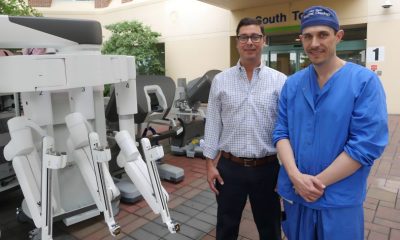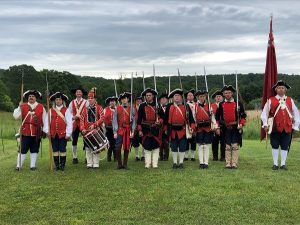Local Government
Councilman Lloyd asserts Valley Health COVID vaccine mandate is the ‘emergency’
In an email response to Royal Examiner’s July 19 inquiry on what he considers the emergency nature of his ordinance proposal to prevent private-sector employers, among others, from reassigning or terminating employees who refuse the COVID-19 Coronavirus vaccine, Front Royal Town Councilman Scott Lloyd referenced Valley Health’s July 19 announcement of a vaccine mandate for all its employees and health care workers. Valley Health’s public relations department has been contacted for a response to Lloyd’s assertions and claim that he has been contacted by a significant number of their employees, including medical professionals, about concerns about being mandated to receive the vaccine. We will publish their response when received.
Lloyd also compared being mandated to receive the vaccine outside traditional, non-emergency drug approval standards to past abusive governmental medical practices, including “Tuskegee experiments” and “forced involuntary sterilization of the ‘unfit’.

Royal Examiner Photos by Roger Bianchini
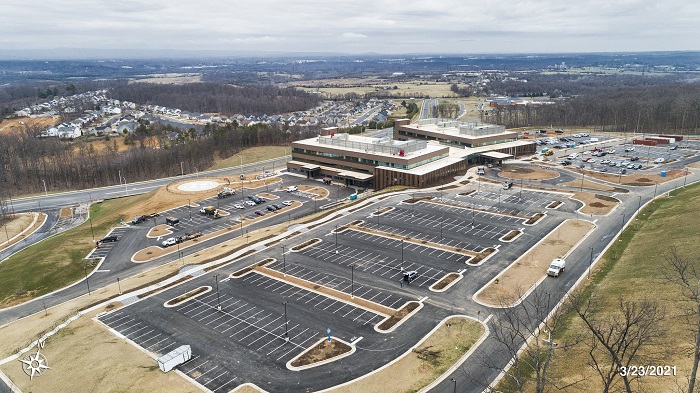
“The emergency: The code defines emergency measure as ‘an ordinance or resolution to provide for immediate preservation of the public peace, property, health or safety’,” Lloyd began, adding, “In Tuskegee experiments and programs of forced involuntary sterilization of the ‘unfit,’ (even, or perhaps especially, here in Virginia), the U.S. Department of Health and Human Services convened Commission to study the conditions under which testing might occur on human subjects,” Lloyd wrote, referencing a resultant “Belmont Report”.*
In addition to worrying over the speed with which COVID vaccines have been approved for “emergency” mass distribution without traditional approval processes, Lloyd’s references to testing, Tuskegee and forced sterilizations are telling in his perception of urgency in bringing his self-termed “Medical Freedom” or “Anti-Coercion” ordinance against mandated Coronavirus vaccinations forward on July 26, rather than August 2. More on that urgency below, but first some historical background on the councilman’s federal sterilization and Tuskegee program references leading to the Belmont Report. The writer apologizes for the length of this article, but believes context and detail are crucial to approaching council’s scheduled July 26 action on Councilman Lloyd’s “Medical Freedom” ordinance proposal. – So, get the popcorn kids.
Learning from the past?
According to an ACLU (American Civil Liberties Union) link provided by Lloyd in his email: “One of the less well-known episodes in Virginia history is its practice of forced sterilization begun during the heyday of the eugenics movement in the early 20th century – a Virginia-based movement that sought to protect the ‘purity of the American Race’. Virginia’s legal sterilization program was enacted into law in 1924 – the same year the legislature adopted the Racial Integrity Act that prohibited interracial marriages.
“Virginia’s Eugenical Sterilization Act of 1924 became the model for the nation after it survived constitutional review by the U.S. Supreme Court in Buck v. Bell (1927). The high court ruled that the state’s law allowing forced sterilization of ‘any patient afflicted with hereditary forms of insanity, imbecility …’ for the greater welfare of society did not violate the Fourteenth Amendment’s guarantees of due process and equal protection under the law … Tragically, it is estimated that between 7,200 and 8,300 people were sterilized in Virginia from 1927-1979 because they were deemed by society at the time to be unworthy or unfit to procreate. In most cases, the individuals were ‘patients’ at state mental institutions …”
WOW, but that’s not all.
A little online research revealed that the “Tuskegee Experiment” was a 40-year study (1932-1972) of “syphilis-infected Negro males” overseen by the U.S. Public Health Service and Centers for Disease Control and Prevention. It is considered a U.S. governmental study unethical in nature in that it essentially used its subjects as lab rats, who were lied to about the nature of the study and from whom effective treatment of the disease with penicillin when it was discovered in the mid-1940s to be a cure, was withheld.
The study ended in 1972 after being outed by a report on it by the Associated Press.
Wikipedia observes: “The purpose of this study was to observe the natural history of untreated syphilis. Although the African-American men who participated in the study were told that they were receiving free health care from the federal government of the United States, they were not.”
In 2021, the CDC website traces the study, its timeline, and its consequences:
“The study initially involved 600 Black men – 399 with syphilis, 201 who did not have the disease. Participants’ informed consent was not collected. Researchers told the men they were being treated for ‘bad blood,’ a local term used to describe several ailments, including syphilis, anemia, and fatigue. In exchange for taking part in the study, the men received free medical exams, free meals, and burial insurance.
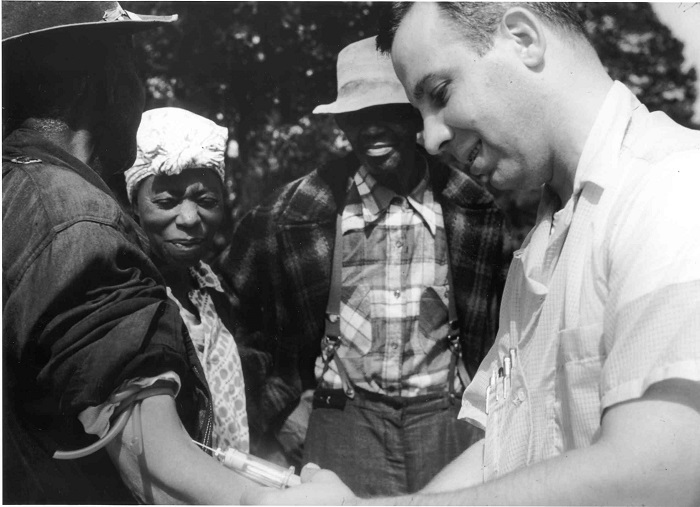
A doctor injects patient in the Tuskegee Experiment – Wikipedia Public Domain/Source, National Archives
“In 1972, an Associated Press story about the study was published. As a result, the Assistant Secretary for Health and Scientific Affairs appointed an Ad Hoc Advisory Panel to review the study. The advisory panel concluded that the study was “ethically unjustified”; that is, the “results [were] disproportionately meager compared with known risks to human subjects involved,” the CDC summary continues, adding, “In October 1972, the panel advised stopping the study. A month later, the Assistant Secretary for Health and Scientific Affairs announced the end of the study. In March 1973, the panel also advised the Secretary of the Department of Health, Education, and Welfare (HEW) (now known as the Department of Health and Human Services) to instruct the USPHS to provide all necessary medical care for the survivors of the study. The Tuskegee Health Benefit Program (THBP) was established to provide these services. In 1975, participants’ wives, widows and children were added to the program. In 1995, the program was expanded to include health, as well as medical, benefits. The last study participant died in January 2004. The last widow receiving THBP benefits died in January 2009. Participants’ children (10 at present) continue to receive medical and health benefits.”
In 1973, a class-action lawsuit was filed on behalf of the study participants and their families, resulting in a $10 million, out-of-court settlement in 1974.
On May 16, 1997, President Bill Clinton issued a formal Presidential Apology for the study. With a number of aging survivors and their family members present at the White House, President Clinton apologized for their experience of the Tuskegee Experiment:
“The people who ran the study at Tuskegee diminished the stature of man by abandoning the most basic ethical precepts. They forgot their pledge to heal and repair. They had the power to heal the survivors and all the others and they did not. Today, all we can do is apologize.”
Back to the Present
Back in Front Royal, Virginia, in July 2021, Councilman Lloyd believes the above histories have lessons for today. Of the Belmont Report grown out of the Tuskegee Experiment experience, Lloyd wrote Royal Examiner: “The Belmont Report states: ‘An agreement to participate in research constitutes a valid consent only if voluntarily given. This element of informed consent requires conditions free of coercion or undue influence’ …
“What Valley Health is doing clearly fits the definition of ‘coercion’, above,” Lloyd’s email of July 20 states, continuing, “Some people who would not take this vaccine are deciding to take it not because they want it, but because they are afraid of losing their job. Every one of these cases is an emergency, as is the fact that the major health provider in our town is engaged in a systemwide campaign of coercion and undue influence with regard to its employees.

Royal Examiner File Photo at ribbon cutting of Valley Health’s new Warren Memorial Hospital. According to Councilman Lloyd, a number of Valley Health employees, including medical professionals, have contacted him concerned about the new COVID-19 employee vaccination mandate by the regional health provider.
“Like I said, I have heard directly from dozens (two dozen just today) of Valley Health employees who feel they are being put in the impossible situation of having to choose between their livelihood (some of them have been health professionals for decades) and a vaccine they do not want. The widespread distress that this causes in our community is an emergency,” Lloyd asserts. “The people I am talking to will experience real harm without protection, and that economic distress will cause real pain in our community. Some of the people I am talking to are pregnant or have newborn children, some are carrying the insurance for their family, for some, Valley Health is the household’s only source of income. Many, I believe most, of these will be ‘subject to suspension or termination’ before our next regular meeting in August, so emergency action is necessary in July.”
We contacted Lloyd by email for elaboration on his apparent assertion that distribution of COVID-19 vaccinations might qualify as “medical experimentation” as opposed to distribution of adequately, if more speedily tested vaccines for a pandemic credited with taking nearly 4.1-million lives worldwide, over 611,000 nationally, including 61 in Warren County in about 18 months. It is a public health emergency considered to still be in progress, with a Fourth Wave surge being reported in many areas, particularly among unvaccinated populations.
The FDA perspective
Prior to receiving Lloyd’s Tuesday afternoon emailed response to our questions, we went to the Food & Drug Administration (FDA) website to see that federal approval agency’s take on the COVID-19 vaccination distribution under a public health “emergency” declaration. The site asserts:
“The FDA has regulatory processes in place to facilitate the development of COVID-19 vaccines that meet the FDA’s rigorous scientific standards,” the FDA states. They elaborate that “The HHS (Health and Human Services) Secretary declared that circumstances exist justifying the authorization of emergency use of drugs and biological products during the COVID-19 pandemic, pursuant to section 564 of the FD&C Act, effective March 27, 2020.”
Of the necessity of speeding up the testing and distribution process for what is considered by medical professionals around the world to be a public health emergency and worldwide viral pandemic, the FDA site adds: “FDA recognizes the gravity of the current public health emergency and the importance of facilitating availability, as soon as possible, of vaccines to prevent COVID-19 – vaccines that the public will trust and have confidence in receiving.”
Of course, if you believe the same, or same type, of people are running FDA, HHS, CDC or other federal agencies cited in medically obtrusive and immoral activities, some racist in nature, conducted in the early to mid-late 20th century, such assurances may sound hollow.
Lloyd’s perspective
Of his perspective on the testing and approval status of COVID-19 vaccinations, Lloyd wrote Royal Examiner later Tuesday afternoon:
“I think that formally we remain in the trial phase for all available vaccines so I think the Belmont Report speaks directly to this situation. I think I would describe it as the ‘research’ or ‘trial’ phase; I doubt I would use the term ‘experimentation.’ I would probably describe the mRNA vaccines as ‘experimental,’ as they’ve never been tried in humans and it is not possible to know if there are any long-term effects from using them, which would be the type of potential harm that concerns me the most with that particular category.”

Links on the CDC website about mRNA vaccines development related to COVID-19
According to the CDC and other medical and news source websites, mRNA (messenger RNA) vaccines were among the first authorized for use against COVID-19 in the U.S., including the Moderna and Pfizer, the latter of which this reporter received his second dose of from Valley Health on February 3, fortunately with no side effects from either dose to this point. According to the CDC website, the mRNA vaccines “do not interact with human DNA in any way” and “do not introduce the live COVID virus” into the recipient’s body or cell nucleus. They have been researched for decades in the treatment of various health ailments including rabies, the flu and ZIKA, among other infectious diseases, the CDC notes.
Of the process by which they do work, the CDC writes of mRNA: “To trigger an immune response, many vaccines put a weakened or inactivated germ into our bodies. NOT (emphasis added) mRNA vaccines. Instead, they teach our cells how to make a protein – or even just a piece of a protein – that triggers an immune response inside our bodies. That immune response, which produces antibodies, is what protects us from getting infected if the real virus enters our bodies.”
It would seem that this process, avoiding some more cellularly intrusive methods of many traditional vaccines and with several decades of infectious disease research behind it, is why mRNA vaccines were among the first to be approved for use under public health “emergency” standards. But is that enough to allay the fears of some vaccine skeptics?
“The attitude of some is that, because of the large number of people who have received it, it is almost like they are not in trials anymore, (I have heard some doctors make this argument),” Lloyd wrote the Examiner, continuing, “I think these sorts of formalities matter, especially when dealing with a new drug.
“That said, I think that the Belmont Report* is a touchstone for matters of informed consent outside of clinical trials and ‘human research’ because it defines what is impermissibly coercive in the context of informed consent. In other words, when the trials end, I do not think that the behavior that falls under ‘coercion’ as defined in the report becomes ‘not-coercion’ because there is no more trial.”
Information or Opinion?
Perhaps the operative word in Lloyd’s analysis is “informed”.
First, one would ask: Is the federal public health apparatus and medical establishment “informed” enough to make an “emergency” judgement the vaccines distributed are safe for general human use?
And on the other side, the question is: Are those fearful of taking those “emergency” authorized vaccines “informed” enough on what methods the vaccines utilize in offering immunity against the COVID-19 Coronavirus, and what testing as been done to assure that the human health risk is minimal, and that, that risk is concentrated on those with specific pre-existing medical conditions?
For in the space between the answer to those two questions would seem to lie the legal justification for either a public or private-sector mandate that employees or members who have contact with other employees, members or customers must be vaccinated; versus as Councilman Lloyd and the constituent base he seeks to represent believe, such a mandate presents an immediate and dangerous health risk to them that municipal governments should legislate against, regardless of previous state or federal legal precedents concerning public health emergencies.
On the topic of “informed consent”, Councilman Lloyd wrote: “I have looked into AMA (American Medical Association) and other definitions of ‘informed consent’ and they mention freedom from coercion without defining ‘coercion’. I think the definition in the Belmont Report rings true and I would be surprised to find a definition anywhere that deviates widely from it.”
As to the question of the “informed” basis for his concerns, based on the health concerns of those he has heard from reluctant to be vaccinated, Lloyd claims a largely informed constituency:
“You asked about the validity of the medical objections, which I think I can answer quickly: I have not been looking very closely at the research at all. I see things mentioned here and there and some of them seem concerning, but my interest is not whether it is right. If a person does not want a vaccine because he thinks there are aliens in it; I would think he is wrong and I would also defend his right to decline the vaccine. I will say, though, that these are medical professionals: nurses, nurse practitioners, and doctors who are contacting me. I am not a medical professional; I would say they are in a better position to evaluate the various medical claims, and their perspectives are highly sophisticated, backed up with real stories of what is occurring ‘on the ground’ as they say.”
Decisions, decisions
So, remaining and fundamental questions facing town council July 26, appear to be: Are Lloyd and those he is hearing from operating from documentable facts concerning alleged medical dangers from receiving COVID-19 vaccines okayed for circulation by the FDA of 2020-21, or are their fears a result of susceptibility to alarmist conspiracy theories in wide circulation in an “alternate fact” social media universe?
As noted, Lloyd asserts many who have contacted him are medical professionals and Valley Health employees in a position to know “what’s going on, on the ground” regarding COVID vaccinations, or at least they claim to be. Perhaps some will show up July 26, to identify themselves, their credentials, and state the basis for their concerns about being vaccinated – perhaps.
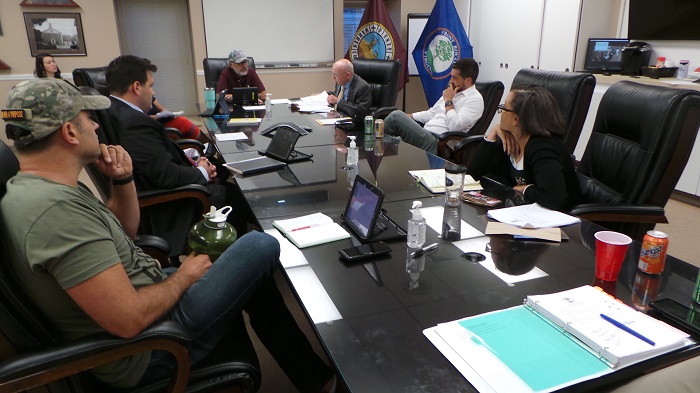
How will Lloyd’s colleagues react to his introduction of his COVID vaccine-related ordinance as an ‘emergency’ measure designed to counteract Valley Health’s new mandate all its employees be vaccinated? – We’ll find out on Monday evening, at the WCGC.
Otherwise, Lloyd’s colleagues on the Front Royal Town Council will be asked to accept on faith that there is a pending employment emergency based on a legitimate and grounded-in-fact medical concern about the safety of the available COVID-19 vaccinations that somehow Valley Health and other involved agencies have failed to identify, or perhaps can’t be trusted to tell us the truth about if you accept a corrupt federal and medical agency lineage dating to 1924 to 1972. And if jumping that hurdle, council will then face a vote on a perhaps legally unsupportable ordinance proposal based on an assertion made by an anonymous group of alleged medical professionals, and their council sponsor who admits he has “not been looking very closely at the research at all”.
Lloyd did include in his communications with Royal Examiner that he will support public comments on his ordinance initiative during the general Public Concerns portion of council’s July 26 meeting. That sounds like an invitation to his concerned constituents to stand up and be heard, along with those who disagree that the Town has reason or jurisdiction to swim into murky factual and legal waters.
(*Writer’s note: The lengthy Belmont Report developed over 4 years in the wake of the public revelation of Tuskegee Experiment can be found online, one link leading to summaries and the full report is: The Belmont Report | HHS.gov)
Valley Health CEO responds to criticism of its COVID vaccine mandate
Local Government
Joint Public Schools Budget hearing Sees Critique of Schools Admin’s Detail and Past Performance Accountability
The Warren County Board of Supervisors and School Board joint budget work session of April 30th turned into a somewhat accusatory analysis of an absence of detail, a developing lack of trust, and perceived absence of accountability aimed at public schools administrators and financial staff. The most lengthy and critical comments came from North River District Supervisor Richard Jamieson, who noted that while homeschooling his own children, had himself attended public schools as a youth. He asserted that his home schooling preference for his children did not impact his current negative analysis of Warren County Public Schools.
However, following North River School Board member Melanie Salins earlier comments on being unable to have questions she has been asking about budget allocations for four vacant positions responded to in a timely manner by school system staff, Jamieson later launched a 24-minute critique of what he believes are misplaced budgetary priorities contributing to ongoing operational failures educationally and administratively at Warren County Public Schools.
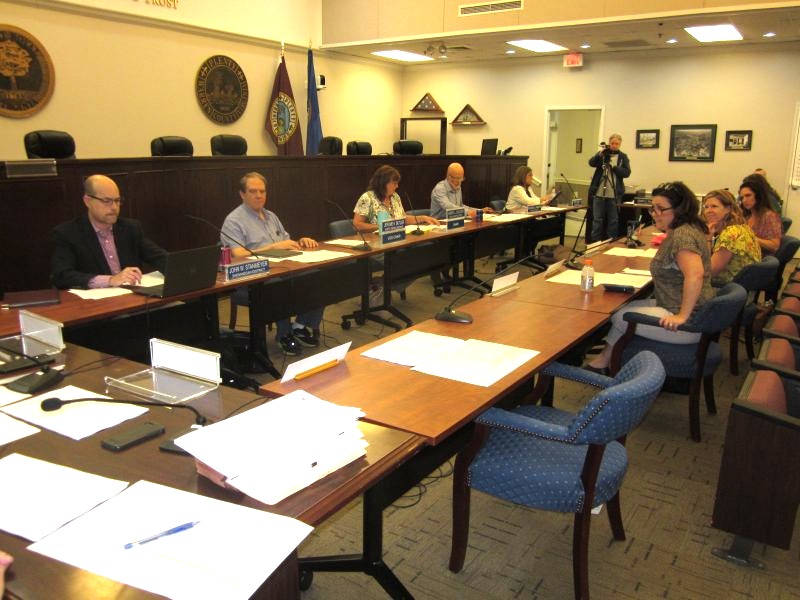
County supervisors at the far side work session table and the school board on near side try to zero in on a workable FY-2025 Public Schools Budget. At this point, a $2.4 million increase in local funding is being sought.
But more on that later. First, we’ll summarize portions of what led up to Jamieson’s negative appraisal of the county’s public school system and its evolving Fiscal Year-2025 budget proposal. It might be noted there was one elected official absence from the full boards’ joint meeting. That was Shenandoah District School Board member Tom McFadden Jr.
Schools Finance Officer Rob Ballentine opened the work session with a presentation of the evolving public schools Fiscal Year-2025 budget, explaining that the State revenue portion of the equation remains in flux, leaving a certain amount of guess work on necessary local funding involved until State officials finalize their FY-2025 budget numbers and that key portion of the anticipated revenue stream to the county’s public school system.
With some updated numbers the projected State contribution was cited at $43,514,552 of what is currently projected as a $78,790,969 total WC Public Schools FY-2025 budget-supporting revenue stream. That number includes a requested County contribution of $31,119,702, an increase of $2,469,702 over the last Fiscal Year County share of the Public Schools budget. Ballentine observed that the $2,469,702 local revenue increase was less than cited at the previous joint budget work session. Other anticipated revenue streams include Federal revenue of $3.55 million, and Miscellaneous revenue of $605,708.
Ballentine noted that the changes in submitted State revenue added about $43,000 to what had been projected previously. “The problem with that is the State sill hasn’t adopted a budget,” Ballentine said, noting a scheduled budget Special Session of the State General Assembly targeted for May 13, with a subsequent final vote on the State budget hopefully by May 15.

WC Public Schools Finance Director Rob Ballentine, left, and Superintendent of Schools Dr. Chris Ballenger prepare for their presentation of the updated FY-2025 school budget proposal, with 42 pages of small-print categories and numbers at their disposal. But where’s the detail, some still asked of certain categories.
“Once they do finalize their budget we’ll get the exact numbers that will go in that column for the State. So, those numbers probably will change, hopefully not much. And if they change, hopefully they’ll get larger — but that remains to be seen,” Ballentine observed.
The question and answer that followed began innocently enough as, first School Board member Melanie Salins asked what had propelled the reduction in the local revenue request, removal of some items or the increase in the projected State contribution. “There were things that we adjusted in the budget,” Ballentine responded, citing a $100,000 reduction from elimination of a testing program that was being deferred to FY-2026, as well as the positive impact of the projected increase in State revenue.
“Jay” Butler sought information on what was driving school budgetary changes upward, including how staffing needs were being met to fill unfilled positions. During discussion of that latter item, School Superintendent Dr. Chris Ballenger observed that it was not generally advisable to wait until the next budgetary year cycle to fill unanticipated staff vacancies because qualified available applicants would be quickly grabbed up by other school systems also looking to fill vacant positions. In response to a question, Dr. Ballenger said that of 33 current staff vacancies, 16 are teaching positions.

As John Stanmeyer studies the numbers, ‘Jay’ Butler queries Schools Admin staff on driving factors leading to a requested $2.49-million increase in local funding to $31.11 million, of a total projected budget of $78.79 million with anticipated State and Federal funding factored in.
Later, Ballenger observed that what students need educationally, as well as socially and economically, were the primary consideration in establishing annual public schools budgetary priorities. The staffing priorities discussion led County Board and joint work session Chairman Cheryl Cullers to express her hope that an Agricultural Program teaching position would be included in and approved as part of the schools FY-2025 budgetary request.
Money well spent?
Prefacing comments beginning at the 2:02:15 mark of the linked County video, Supervisor Jamieson said he felt line-item schools budget questions had been adequately covered, leading him toward another perspective he described as coming “from 40,000 feet or so”. His overview from that altitude was not complimentary:
“I’ve already made a few comments about a kind of crisis of confidence in terms of transparency and what’s visible. My primary concern as a supervisor charged with the responsibility for using taxpayer money is whether accountability is sufficient for the money being spent by the school system. And asking the question is more money being spent correlated to better educational outcomes,” Jamieson began.
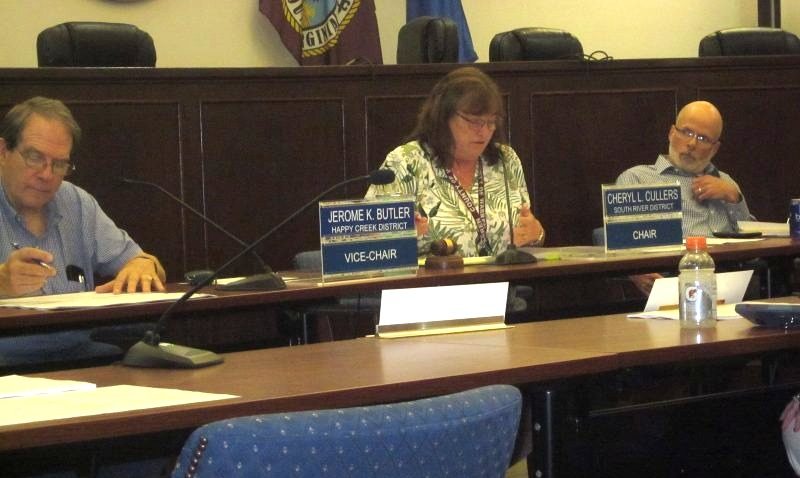
Happy with the line item discussion, Supervisor Richard Jamieson decided to take an ‘overview’ of the Public Schools Budget from ‘40,000 feet’. — He didn’t like what he saw from up there. And it’s not because he’s a home schooler, he assured us.
And while admitting there were differing opinions on answers to those questions, Jamieson said he believed: “That’s not the preponderance of the evidence. That it depends on how the additional money is spent.” Jamieson asserted that he agreed that an excellent public educational system is a benefit to an entire community. However, he continued to note that recent annual statistics indicated that attendance at Warren County Public Schools had peaked, and was staying level, if not decreasing in some areas.
He did cite educational options, including home schooling and private schooling, in this community to public schools. However, he acknowledged that public schools educated the “vast majority” of students in the community. And he did not address whether shifting population and countywide age variables might impact those public school population trends. He did cite constituents he was aware of he said had withdrawn their children from the county’s public schools due to discipline or violence issues within some schools.
To make his point that public school appropriations were not being well spent, Jamieson pointed to four schools in the system that were ranked below federal standards of performance. “The elephant in the room that has been brought up, is that we do have four out of 10 schools that are not meeting federal standards. That’s 40%,” Jamieson pointed out, adding that 40% of the five-person School Board had voted against the submitted public schools budget proposal. As we understand it, that 40% was Salins and the absent Tom McFadden Jr., both of whom appear to have direct or indirect ties to the home or private schooling community here.
Jamieson said that instituting across-the-board raises in a system with a 40% failing standard of its schools, as opposed to identifying and replacing staff that could be tied to those failing standards, was a failed status quo he could not support. As to federal involvement in public education, Chairman Cullers, who was a school nurse in the public school system for years, at another point in the discussion suggested the school system should drop the federal and state implemented SOLs (Standards Of Learning) as a dysfunctional educational measurement tool. However, Jamieson noted that would amount to crossing the people with their hands on the purse strings of the educational system. — Well, at least two-thirds of those purse strings, the third being the local County appropriation he was asserting should be cut.

Flanked by Vice-Chair ‘Jay’ Butler and Richard Jamieson, work session and supervisors board Chair Cheryl Cullers expressed support for some schools staffing requests, as well as taking a shot at SOLs as a dysfunctional educational measurement tool, created as we recall by bureaucrats, not educators.
How may Jamieson’s negative analysis overview impact the supervisor majority’s perspective on the submitted, if not yet finalized FY-2025 Warren County Public Schools budget currently seeking $31,119,702 in local County funding, as noted above, an increase of $2,469,702 from the current Fiscal Year-2024?
Stay tuned as this crucial municipal governmental funding decision approaches a conclusion that may reverberate throughout this community for more than just the Fiscal Year to come.
Local Government
Town Council and Planning Commission Meet for Much-Needed Discussion at Special Joint Work Session
On Monday, April 29, at 7 p.m. in the Front Royal Town Hall on 102 East Main Street, the Front Royal Town Council and the Planning Commission met to discuss vape shops, Planned Neighborhood Development District (PND) zoning, and short-term rentals. Planning Director and Zoning Administrator Lauren Kopishke supported the mayor in guiding the discussion.

A special joint work session is held between the Town Council and the Planning Commission on the evening of Monday, April 29. Royal Examiner Photo Credits: Brenden McHugh.
While vape shops and short-term rentals drew similar sentiments from everyone in the room, the more contentious item and perhaps the driving force behind the gathering was PND zoning. This type of zoning allows for mixed-use development in higher densities, on parcels rezoned to PND, and it is in many ways an improvement on by-right development as it potentially offers affordable housing for those in Front Royal who are struggling to cope with inflation and the cost of living in general. The challenge to PND zoning, which Planning Commissioner Chair Connie Marshner sees clearly, is the scarcity of lots large enough within Town limits to meet the acreage requirement for a planned neighborhood development district, as it is currently regulated by the Town Ordinance. This may explain why, in an application from a developer for PND rezoning that involved a proposed amendment to the ordinance reducing the acreage threshold for PND from twenty-five acres to two, the planning commission passed the application to the council, recommending a reduction to five acres in the case that the council felt uncomfortable with two. In the words of Councilwoman Amber Morris, the two-acre prospect was “offensive.” Indeed, the council denied any amendment to the ordinance and the application.

Planning Director and Zoning Administrator Lauren Kopishke helps Mayor Lori Cockrell guide the Town Council and the Planning Commission through a discussion of vape shops, PND zoning, and short-term rentals.
To do justice to Morris’s position, it is offensive because it would open a “floodgate” to untrammeled development that may neither respect the Town’s rustic charm nor be sensitive to the needs of its infrastructure and the way of life that its natives have built here. At the same time, Kopishke has emphasized that there are so many other stipulations in the rezoning to PND that the floodgate would never be opened. Having provided the council and the commission with extensive reading in their agenda packet that highlighted how other localities are handling this type of development, localities from which she is actively gathering information in staff’s ongoing PND enterprise, Kopishke urged those present to discuss what they like about the current ordinance and what they do not like. After a somewhat tangential conversation, most of the council members said they would like to leave the ordinance the way it is, with a threshold of twenty-five acres for PND mixed residential and fifty for PND commercial.
Morris said it is not the government’s job to provide affordable housing. Also, there is nothing wrong, in her opinion, with preservation. Just because a parcel is undeveloped does not mean it needs to be developed. The evening ended with the sense that things were as much as before. There is only one PND zone in Front Royal, and it is undeveloped. The Comprehensive Plan does indeed call for higher density development, but what that looks like seems to be a matter of degrees in which some are prepared to be more extreme than others. Consensus between these two bodies would be a very rare diamond.
Local Government
County Budget Work Session Addresses Staff Health Care Costs, Charging Town for Solid Waste Dumping, and Old Oak Ln. Projects
Following a 4 p.m. tour of the new Senior Center renovations slated to be completed by June (see related story) and a late-added 5:30 p.m. Closed Session (Item A), the Warren County Board of Supervisors convened to yet another Fiscal Year-2024/25 budget work session. This one, convened about five minutes after the scheduled 6 p.m. start due to the length of the closed session, included one outside agency, the Virginia Department Of Transportation (VDOT) on the Six-Year Plan for road improvements in the county, and five county departmental presentations.
Those budget-related reports in the order presented were:
- Presentation – Virginia Department of Transportation Secondary 6-Year Plan
- Discussion – Public Work Transfer Station Rates – Mike Berry, Public Works Director
- Presentation – Old Oak Lane, Phase IV (4) and V (5) Updates – Mike Berry, Public Works Director and Sanitary District Manager Michael Coffelt
- Discussion – 2024-2025 United Healthcare Insurance Renewal – Jane Meadows, Deputy County Administrator, Kayla Darr, Human Resources Manager
- Discussion – Orientation for the Department of Social Services – Jon Martz, Director of Social Services
- Requested Proclamation: April is Child Abuse Prevention Month – Department of Social Services
Since it was a work session, no actions were taken on the presentations or staff recommendations. The board took what they heard under advisement as they move toward a final budget proposal in the months leading to the start of Fiscal Year-2025 on July 1, 2024. Since no action can be taken at a work session, the Social Services Department requested proclamation on recognizing April as Child Abuse Prevention Month would be made at the board’s first meeting of May, Tuesday, the 7th of May.

County Director of Social Services Jon Martz and staffers April White and Christine Lawson outlined their programs and service number increases into the new fiscal year and requested board acknowledgment of ‘April is Child Abuse Prevention Month’.
Among highlights of those presentations and board discussion of them was a staff recommendation from Public Works Director Mike Berry to begin charging the Town of Front Royal for its use of the County’s Solid Waste Transfer Station to dump residential trash. Coupled with a $10 hike in the County’s current tipping fee of $69 to $79 at the Transfer Station, charging the Town “what other commercial users” are charged was projected to increase County revenue by $474,000 to help cover rising costs.
Another highlight came during Deputy County Administrator Jane Meadows update on renewal of the United Health Care Insurance Plan for County employees. In describing the existing situation, employee contributions to their health care coverage balanced against salaries, as well as health and age profiles of county employees, it was observed that may of the County’s employees “feel undervalued” by their employer.
Board Chairman Cheryl Cullers expressed some distress at that description of what is apparently a significant portion of the County’s staff that may be considering a move to a higher-paying or larger employer share of health care costs municipality. And while it may not be a totally new phenomena in the local governmental employer/employee relationship, it is one the board chair believes needs to be dealt with proactively in coming years. How that might be achieved without increasing County revenue through higher service rates, as suggested by the public works director regarding the Town’s use of the County’s Solid Waste Transfer Station, or general tax hikes to provide additional across the board general services revenue will be a dilemma the board must face in coming fiscal years.

County Director of Social Services Jon Martz and staffers April White and Christine Lawson outlined their programs and service number increases into the new fiscal year, as well as requested board acknowledgment of ‘April is Child Abuse Prevention Month’.

Another discussion highlight came in the updates on Old Oak Lane Phases 4 and 5 in the Shenandoah Farms Sanitary District. Staff reported ongoing issues with “production defects” of box culvert sections delivered to the County by the contracted vendor causing ongoing delays as the Phase 4 project creeps toward completion. But that completion of the Old Oak Phase 4 project cited at an approved budget of $1.6 million, with expenditures to date of $796,792, with a remaining budget of $803,208, was recommended for completion. The staff summary also noted that the County “has not paid for the Eastern Vault $249,000 invoice for station 53+00 due to the deficiencies noted.” It was further noted that Public Works has “expended $173,000 in corrective action” with more corrective repairs to come.
As for Old Oak Phase 5 more at a planning stage, due to “Design Constraints” and related costs, staff recommended that the “County Administrator should send a letter to VDOT cancelling the Old Oak Phase V (5).” However, it was added that the County Public Works Department “complete the project internally using current maintenance contracts and approved SFSD (Shenandoah Farms Sanitary District) FY24 road improvement funding.” It was added that: “County General funding no longer necessary for internal SFSD project” which might draw the attention of some Farms Sanitary District residents regarding the use of their Sanitary District tax revenue.
The Closed Session involved legal consultation on wide range of matters involving liabilities, debt, potential bank actions, and recovery of assets related to the Front Royal-Warren County Economic Development Authority (FR-WC EDA or now WC EDA) financial scandal. The motion made into the Closed Meeting read:
“I move the Board enter into a closed meeting under the provisions of Sections 2.2-3711(A)(7) and (A)(8) for consultation with legal counsel pertaining to actual or probable litigation and the provision of legal advice regarding the Industrial Development Authority of the Town of Front Royal and the County of Warren, Virginia (the “EDA”), the Town of Front Royal, the EDA vs. Jennifer McDonald, et al., the Town of Front Royal vs. the EDA, et al., the EDA vs. the Town of Front Royal, other potential claims and litigation relating to other possible liabilities of the EDA, the recovery of EDA funds and assets, the outstanding indebtedness of the EDA and potential bank actions related to the same.”
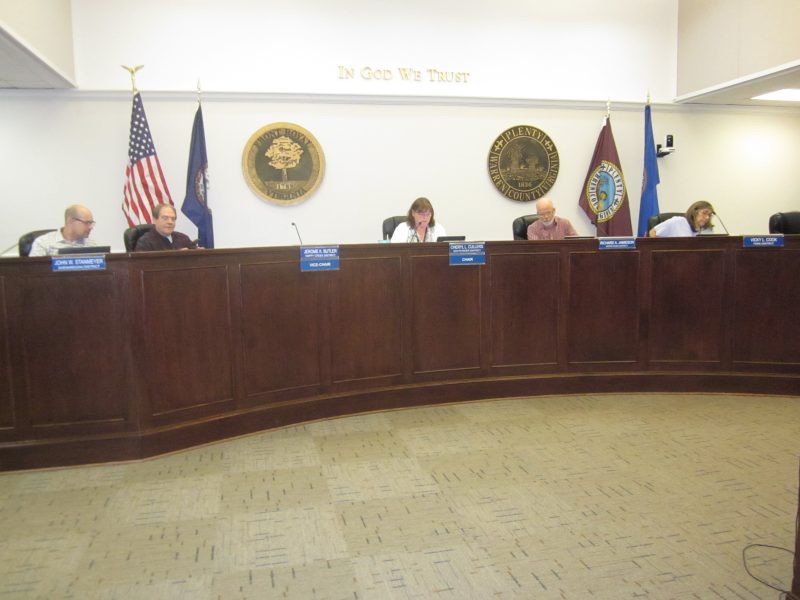
The supervisors came out of the closed session at about 6:05 p.m. to find a captive audience of mostly county staff in the rear of the meeting room, along with VDOT reps Ed Carter and Matt Smith, right to left, in the second row of public seating.

And after the above-cited agenda’s completion, the work session adjourned at 8:25 p.m.
Due to what was described as a vendor “glitch” there is some delay on the work session video being posted. County IT staff hopes the video will be posted by the end of the week. When it is available, it will be linked to this story.
Local Government
Supervisors View New Senior Center Site at Health & Human Services Complex Prior to Budget Work Session
At 4 p.m. Tuesday afternoon, the Warren County Board of Supervisors began its three-pronged April 23rd schedule with a tour of the nearly completed two-year Health & Human Services facility renovations that will see the County-overseen Senior Center relocated from its Chimney Field-area site. According to Deputy County Administrator Jane Meadows, relocation will see an approximate doubling of the size of the senior assistance and activities facility. Meadows later elaborated to us that the square footage of the new Senior Center is 5,922 s.f., with shared space with the Parks & Recreation Department adding an additional 2,780 s.f. expanding total usable space to 8,702 s.f. For comparison, the existing Senior Center on Commonwealth Avenue near Chimney Field, the building is 3,964 s.f. The two-year project cost was cited at $867,000.
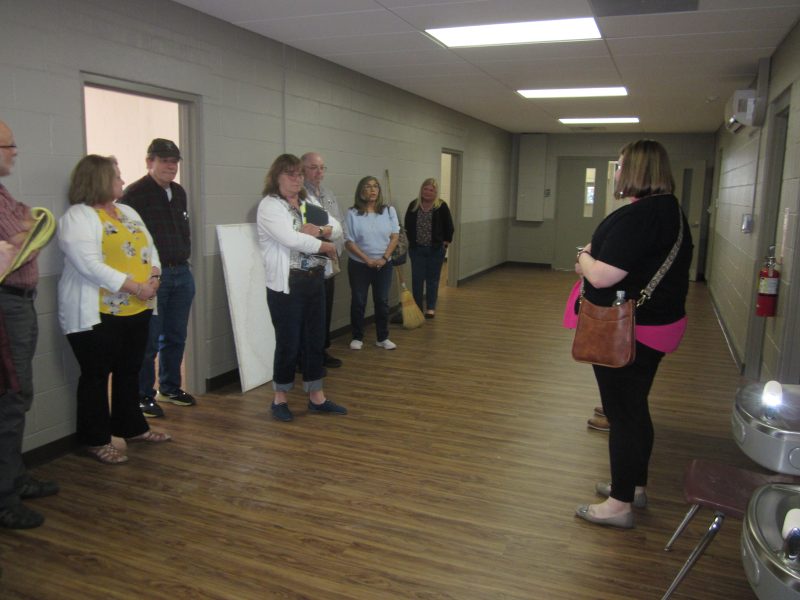
Deputy County Administrator Jane Meadows, right, gives supervisors and other involved personnel an overview of the status of the almost-ready Senior Center in a renovated portion of the County’s Health & Human Services complex off of 15th Street in Front Royal. Below are two perspectives on what appears to be a main dining area with space for other activities as needed. Royal Examiner Photos Roger Bianchini


Costs and returns on investments are high on the county supervisors’ minds right now as they zero in on a Fiscal year 2024/25 final budget that will see the county’s first tax hike in the past five years to fund crucial departmental and outside agency services. Board members new and old seemed impressed with the amount of renovated space and its condition as presented to them by Meadows, along with Senior Services personnel, a number from Seniors First, including Executive Director Jimmy Roberts, Director of Development Greg Stockton, Director of Senior Center Operations Marsha LeBrecht, and Senior Center staffer Misty Alger. Also joining the tour were County Director of Social Services Jon Martz and Assistant Director Christie Lawson.
The target date for opening the Senior Center at its Health & Human Services complex location at the old middle school site off 15th Street is sometime in June, though involved officials declined to get more specific on a precise date at this point as final renovations continue.
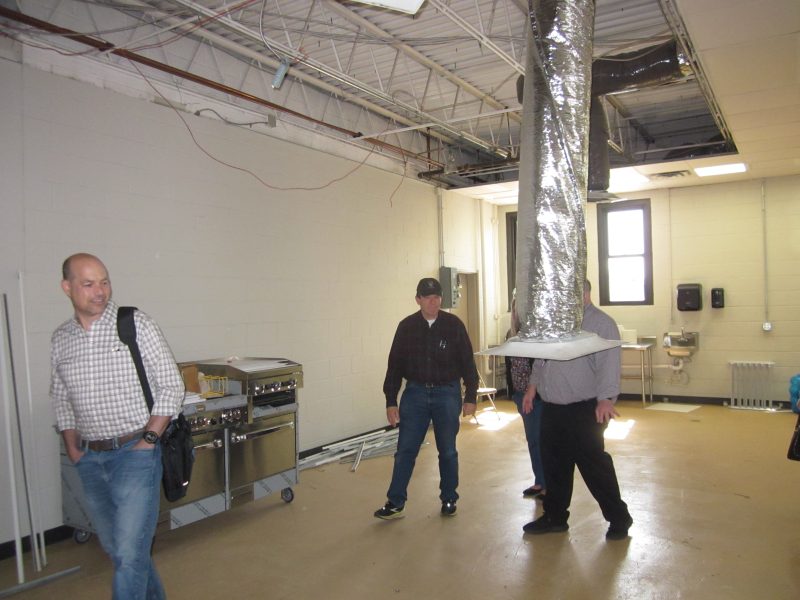
The Senior Center facility tour makes its way through kitchen areas with what appears to be a renovation in progress on the exhaust system hanging from the ceiling. In the third shot below, Warren Senior Center staffer Misty Alger displays a walk-in freezer for food storage in a kitchen area. Cleanliness in food preparation areas was cited and will be encouraged by multiple sink locations.
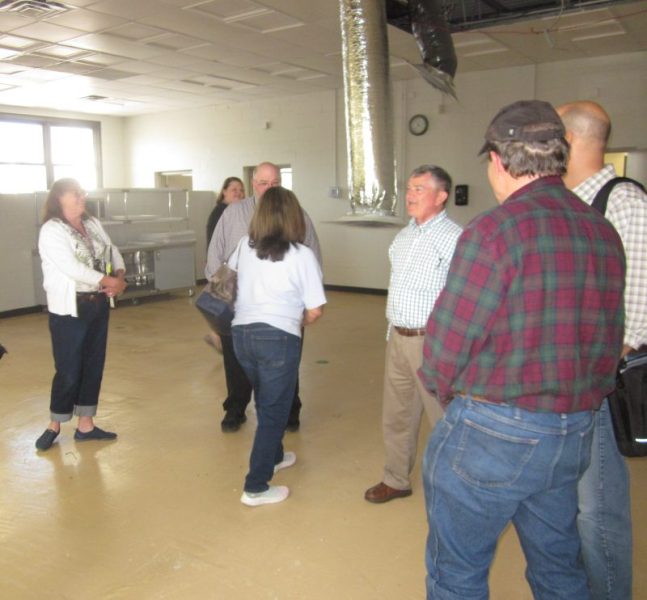

It was noted that the change of locations would also be beneficial in giving attending seniors nearby access to a number of Health & Human Services in the 15th Street complex in addition to the shared Parks & Recreation space. That access includes the County Health and Social Services Departments for assistance seniors qualify for and utilize in maintaining a more beneficial standard of living.

The group gathers at the exit from the large dining area to an outside patio area.
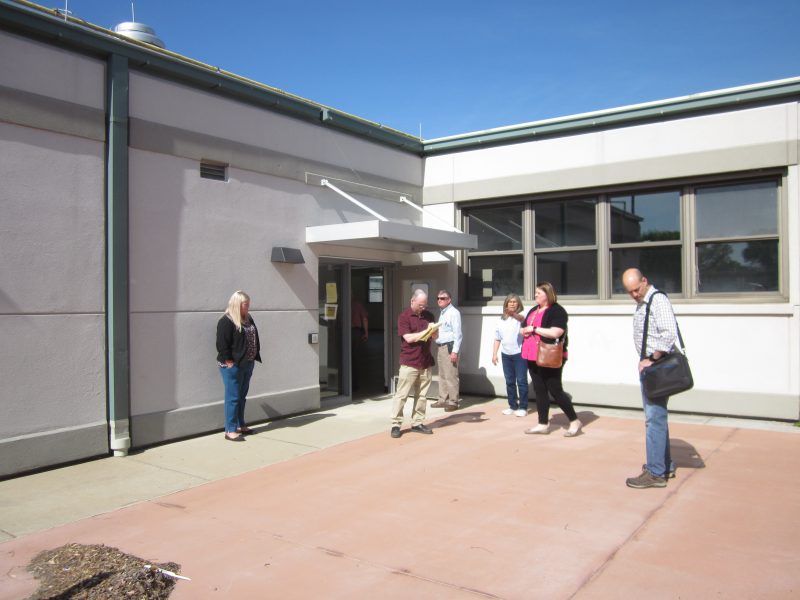
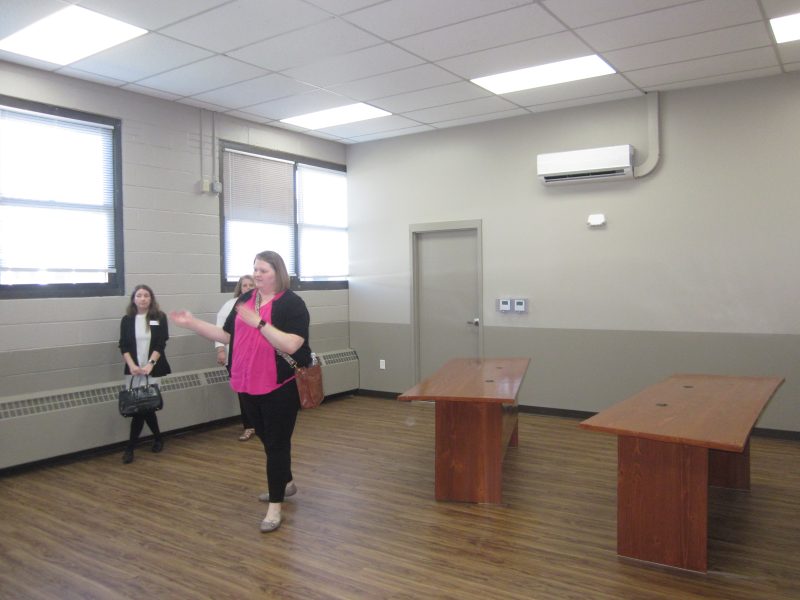
Meadows shows tour auxiliary rooms with work desks and a bathroom area with a walk-in shower.


Local Government
Airing of Differences in Town Council Regular Meeting Leads to Unanimous Vote to Extend Out-of-Town Service to Catholic Diocese
Every meeting of the Town Council has a scarlet thread weaving through a thicket of information. On Monday, April 22, at a regular meeting, starting at 7 p.m. in the Warren County Government Center on 220 North Commerce Avenue, the items threading the labyrinth were related to an out-of-town utility connection contract with the Catholic Diocese of Arlington for 0 Criser Road.

Town Council meets for regular meeting on the evening of April 22 at the Warren County Government Center.
Sensing what is coming next is an imprecise art in government and the status of the Diocese’s application, suffering much discussion throughout multiple work sessions of the council, lingered in a state of irresolution as it was unclear whether the church body would ultimately receive water and septic service from the town at their out-of-town location on West Criser Road, where they plan to develop a sanctuary as well as an auxiliary building to serve as a gymnasium. Still, on Monday night, to use Councilman Bruce Rappaport’s language, the issue reached the end of its road. Even if the council does not work out a boundary-line adjustment of Town corporate limits to include the parcel at 0 West Criser Road, even if the council cannot, therefore, require the applicant to build a sidewalk in accordance with the rules that would govern the development of a parcel within Town limits; and even if members of the council continue to disagree amongst themselves about the coulda, woulda, shoulda pertaining to the Diocese’ offer to offset the cost of a sidewalk, the Town can still extend service to the church body. And they did in a unanimous vote.

Jaden Matthiae, son of Michelle Matthiae and planning commissioner Brian Matthiae, receives a gift certificate from Mayor Lori Cockrell after he led the gathering in the pledge of allegiance.
Having placed 0 Criser Road on a list of areas outside of town that may receive service earlier in the evening in a unanimous vote, the council proceeded later, before the vote on approving the application, to submit for the record their varying views on whether a sidewalk could have been a part of the deal. A sidewalk on West Criser Road is something that all the members of the Town Council, as well as the town manager, desire passionately, as safety conditions are currently less than ideal for school children walking on that road. A parcel on that road might be developed in a way that would possibly increase pedestrian traffic, but this only serves to cement that desire; however, there are different opinions about methodology.

Before the meeting, there was an equipment display in the Government Center’s parking lot so the public could see their tax dollars at work. Above: Town Manager Joe Waltz tries out the Town’s brand-new rubber tire loader, valued at 212K, which will serve with snow removal and assist in water and septic maintenance. Below: Manager of Vehicle/Equipment Maintenance Donald McPaters stands beside a beauty, a brand-new asphalt roller valued at 74K.

The one hundred and twenty-some thousand dollars that the Diocese offered to the Town to offset the cost of a sidewalk could have, in Councilman Glenn Wood’s view, solved the problem. However, the Diocese did not conduct a study of what the sidewalk would ultimately cost, and according to the information available to Town staff, the ultimate cost, including all the engineering concerns, would be upwards of two million dollars. In her statement at the meeting, Councilwoman Amber Morris strongly underlined those engineering concerns, specifically the utilities that would have to be moved to make that sidewalk a reality. Town Manager Joe Waltz emphasized the inadequacy of one hundred twenty-some thousand dollars. It is his view that the real priority on West Criser Road is installing a sidewalk between Skyline Vista Drive and Route 340, where there is not even a bike lane to offset the safety concern.
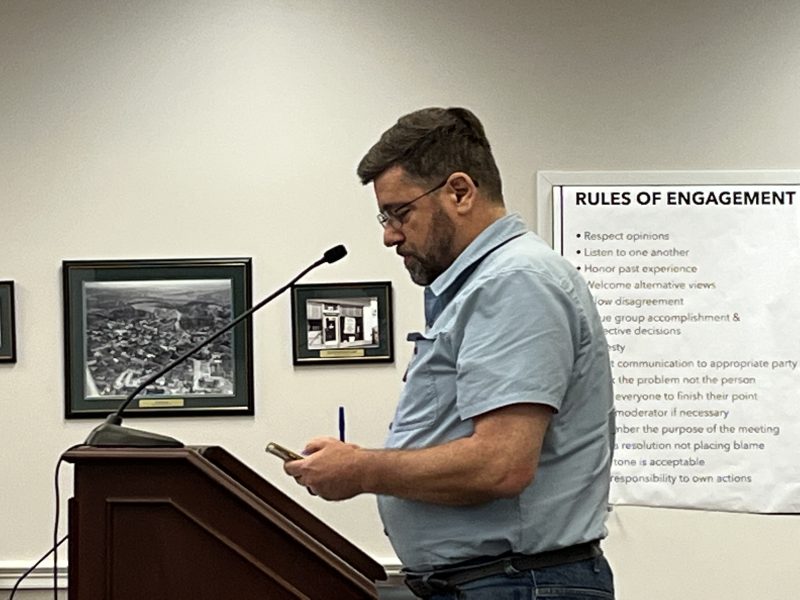
Under public comments, Tom Sayre stands up to address the council on what he perceives to be a pressing need for fiscal transparency, referencing a case from 2022 in which funds were appropriated under circumstances that Town Attorney George Sonnett explained were confidential after Councilwoman Amber Morris interrupted Sayre’s comment to call a point of order. The subject was what she called “alleged conduct,” and in her view, it would be inappropriate for the council to engage in such a comment in the context of a regular meeting. Sonnett encouraged the council not to engage the comment. They did not.
The word on the street is that the gymnasium will precede the sanctuary at 0 Criser Road. The intersection of Luray Avenue and West Main Street is a place of force on Sunday mornings, with much vehicular as well as pedestrian traffic, where St. John the Baptist Church is located across from Maddox Funeral Home. A secondary chapel could relieve that traffic somewhat and the gymnasium could be a resource for the Catholic homeschool community. It certainly sounds like a good thing for everybody.
Click here to watch the Front Royal Town Council Meeting of April 22, 2024.
Local Government
Town Council and Board of Supervisors Enjoy a Brief Liaison Committee Meeting
Having come out of a special meeting where they voted approval for a giveaway of trees purchased by the Town, the Front Royal Town Council joined the Warren County Board of Supervisors for a liaison committee meeting hosted by the county at 6 p.m. on Thursday, April 18 in the Warren County Government Center on 220 North Commerce Avenue. Mayor Lori Cockrell and Councilman Glenn Wood represented the council, while Chairwoman Cheryl Cullers and Supervisor Jerome Butler represented the board.

Town Council meets before the Town-County liaison meeting to hold a special meeting concerning permission to be granted to the Advisory Committee for Environmental Sustainability (ACES) to give away trees valued at $6218.75 with a $1000 delivery fee on Sunday, April 21, for an Earth Day event. This $7218.75 value, paid by the Town of Front Royal for trees that the Horticulture Department purchased, covers ACES’ free plant giveaway. The council unanimously approved the giveaway. Royal Examiner Photo Credits: Brenden McHugh.
The items on the agenda were, respectively, the issue of processing house violations and tenant and landlord enforcement, deferred to July; McKay’s Springs; the transportation and infrastructure committee; an update on school zone cameras; the water supply plan; and a boundary line adjustment for Town corporate limits on East/West Criser Road. The meeting was characterized by agreement and goodwill as the Town and County discussed these items that concerned them. At the same time, Town Manager Joe Waltz and County Administrator Edwin Daley provided them with the information they needed to transact the meeting.

Front Royal Town Council and Warren County Board of Supervisors meet for Thursday night liaison committee meeting at the Warren County Government Center.
Mayor Cockrell pushed for clarification on who exactly owns McKay Springs. Daley explained that three years ago, the Economic Development Authority (EDA) sold their portion to the County, thus reducing the stakeholders to two parties, the Town and the County, both of whom currently own portions and a portion they own together. Under the leadership of Daley and Waltz, the Town and the County are now exploring whether they might develop McKay Springs as a joint venture. The transportation and infrastructure committee would facilitate this discussion, and it would be merely a discussion based on information gathering. Cullers then guided the meeting towards the transportation and infrastructure committee itself. At that point, she and Cockrell mentioned reports from VDOT that the Town and County received separately.
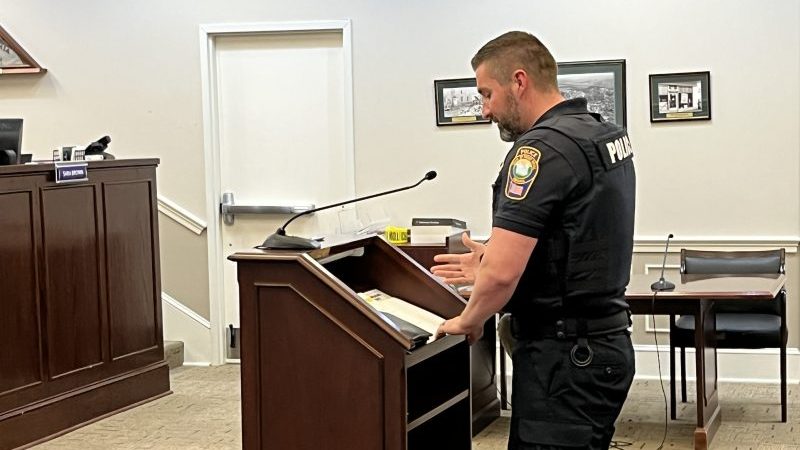
Captain Zachary King of the Front Royal Police Department gives an update on school zone cameras to the liaison committee.
After they received an update about cameras in school zones from Captain Zachary King of the Front Royal Police Department and after they heard from Waltz about the annual determination of the Town’s excess volume in water and septic capacity, that is, capacity available for future development, the town manager explained the need for a boundary line adjustment on East/West Criser Road, where in a recent out-of-town service request it came to the Town’s attention that the boundary line does not reflect every segment of the road owned by the Town which, currently, owns segments that are outside of corporate limits, even though the Town owns all the land that East/West Criser Road is built on. The adjustment would bring all segments of the road into corporate limits as well as any segment marginal to the road that the Town already owns. There did not seem to be any resistance from the board to rectifying this oversight.
At 6:50 p.m., all agenda items having been addressed, the meeting was resolved with the determination to hold another liaison committee meeting in July.






